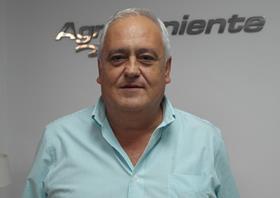
It has been more than 30 years since Grupo Agroponiente was created and you have been at its helm for the duration, along with many of the people who helped you found the group. What has been the secret to getting where you are today?
Diego Amat: As usual, with this type of question there is no secret – or, at least, the secret is very simple: nothing but work, enthusiasm and teamwork.
What are you proudest of having achieved in the last three decades?
DA: What makes me most proud is to see how a company that was born out of humility and enthusiasm has today become an important pillar of the industry. In our first year we turned over €24m and now we do more €300m; employee numbers have grown from 60 to more than 1,000; we started with a 10,000m2 warehouse and now we have more than 25 logistics centres.
Throughout these 30 years, our producers have grown and built this project together with us. And I am also proud of the respect shown by our shareholders, who has always allowed the management team to get on with its job and, of course, the professional team that has made the company what it is today.
Grupo Agroponiente exists to provide a service to the grower. What is that philosophy built on and what value does it bring to the company?
DA: There are various ways in which we can help producers to maximise their profitability, be it by staying at the cutting edge of new technologies or keeping up with the latest market trends and transferring this knowledge to our growers. All this has resulted in more than 3,000 farmers trusting us – loyalty levels are very high in the company.
Agroponiente was recently acquired by private equity fund Abac Capital, while at the same time the company bought a greater share of Vegacañada and Lara Castañeda. What was the thinking behind these decisions?
DA: This strategy is all about the future and ensuring that we continue on the path of professional development that we have always championed. In order to compete internationally, this sector needs to become more professional and develop strong groups. The market has also evolved from having a large number of customers to ten large groups who together control around 80 per cent of sales. We have to align ourselves to what the market demands.
Do you think the interest of large investment funds in Agroponiente is good news for the fresh produce sector?
DA: Absolutely, it’s good for the investor and it’s good for Almería. It shows that we are doing a good job, and that the sector is in good health. We should feel proud that we are the first company in the region to have gone down this path. It will help us to finance future projects and is without doubt a great opportunity that we intend to take full advantage of and that will help put the sector on the right path for the future.
Why do you think Abac Capital has chosen to invest in Almería’s agricultural sector and, specifically, in Agroponiente?
DA: Investors are looking to invest in companies with a proven solvency, international focus, highly trained and competent management team, solid history and clear focus on efficiency. They are also interested in primary sectors that are not affected by the vagaries of fashion or the economy that offer good diversification potential. Agroponiente ticks all of these boxes.
In what ways will the takeover affect the group’s overall strategy?
DA: It will bring about a general improvement in the company that will benefit all our growers, allowing us to upgrade our facilities and optimise costs, forge new alliances with producers, diversify into new business activities and underpin the continued growth of the company.
Will there be any changes in terms of the day-to-day management of the company?
DA: The same management team that has brought the company to where it is now will remain in place, with the addition of new members to help improve the group’s performance. A few weeks ago we announced that Miguel López Martínez, who has been president for the past four years, will be our new CEO, so the group will continue to be led by our own people.
Why do you think it is so important for growers to come together to form powerful marketing groups?
DA: Forging strong groups allows any grower, whether they have 1 or 100ha, to sell their products worldwide. We allow them to compete under better conditions in the market and increase their professionalism, leading to improved yields.
What are the major challenges you face in the coming years and those of the sector in general?
DA: The greatest challenge is to ensure that the company and the sector maintains and even strengthens their capacity to compete with other producing countries, a threat that is growing day by day.



